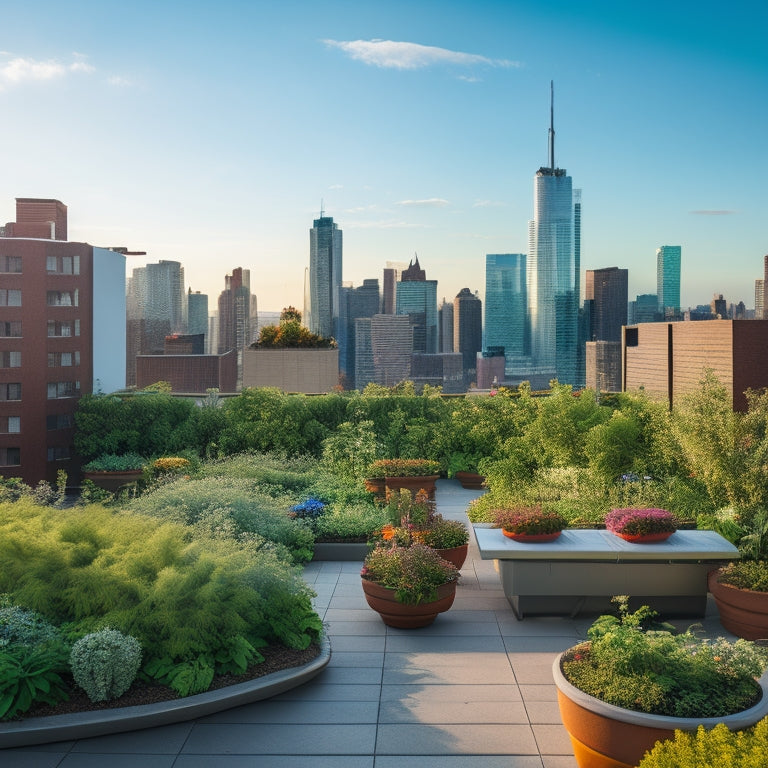
5 Ways Rooftop Gardens Boost Urban Livability
Share
You can transform your urban environment by incorporating rooftop gardens, which boost livability in five significant ways. To begin with, they mitigate the urban heat island effect, reducing city temperatures by up to 4°C and increasing energy efficiency. Following that, they support local ecosystems, increase biodiversity, and provide habitats for urban wildlife. To conclude, they offer stormwater management solutions, reducing runoff and alleviating pressure on drainage systems. Lastly, they positively impact mental health, reducing stress levels and promoting relaxation. To wrap up, they enhance property values, increasing appeal and sustainability. As you explore these benefits, you'll uncover even more ways rooftop gardens can revolutionize your urban landscape.
Urban Heat Island Mitigation
As urban dwellers, you're likely familiar with the sweltering heat that can radiate from city streets and buildings, but rooftop gardens can play a crucial role in mitigating this urban heat island effect by providing a natural cooling system.
By incorporating vegetation and greenery into urban landscapes, rooftop gardens can help reduce the temperature in cities by up to 4°C. This natural cooling system not only provides relief from the heat but also increases energy efficiency by reducing the need for air conditioning.
In addition, rooftop gardens can foster community engagement by providing a shared green space for residents to socialize and relax. This, in turn, can lead to stronger community bonds and a greater sense of ownership among residents.
Increased Biodiversity and Habitat
Rooftop gardens provide a unique opportunity for you to reintroduce native plant species and support local ecosystems, thereby increasing urban biodiversity. By incorporating a diverse range of plant species, you can create habitats that support local wildlife, contributing to wildlife conservation efforts. This, in turn, helps maintain ecological balance in urban areas.
Green spaces on rooftops can become vital corridors for urban wildlife, allowing species to move through the city and interact with their environment. As you design and maintain your rooftop garden, consider incorporating features that cater to local species, such as native flowers that provide nectar for pollinators or shrubs that offer shelter for birds. By doing so, you'll be supporting the complex web of relationships within urban ecosystems, ultimately enhancing the livability of your city.
Stormwater Management Solutions
By providing a permeable surface, your rooftop garden can greatly reduce stormwater runoff, mitigating the burden on urban drainage systems and decreasing the risk of combined sewer overflows. This is especially important in urban areas, where impervious surfaces like pavement and buildings can exacerbate stormwater management issues.
As a form of green infrastructure, rooftop gardens offer a sustainable design solution to this problem. By absorbing rainfall and reducing runoff, your rooftop garden can help alleviate pressure on municipal drainage systems, reducing the likelihood of flooding and water pollution.
In addition to mitigating stormwater runoff, rooftop gardens can also help to filter and clean rainwater, reducing the amount of pollutants that enter urban waterways. This not only benefits the environment but also helps to reduce the economic burden of stormwater management on municipalities.
Improved Mental Health Benefits
Urban dwellers surrounded by concrete and steel can find solace in rooftop gardens, which have been shown to positively impact mental health by reducing stress levels and promoting relaxation.
You can experience this firsthand by spending time in a rooftop garden, where the calming effects of nature can help mitigate the pressures of urban living. Research has demonstrated that access to green spaces can lower cortisol levels, heart rate, and blood pressure, all indicators of stress.
Rooftop gardens also provide opportunities for community connection, which is essential for mental well-being. By participating in garden maintenance or social events, you can build relationships with neighbors and develop a sense of belonging. This, in turn, can lead to increased feelings of happiness and reduced symptoms of anxiety and depression.
As you cultivate a connection with nature and your community, you'll reap the mental health benefits that rooftop gardens have to offer. By incorporating these spaces into urban planning, cities can promote a healthier, more resilient population.
Enhanced Property Values
As you invest in a rooftop garden, you can expect a significant increase in your property's value, with studies showing that green roofs can boost real estate prices by up to 10%. This economic impact is largely due to the enhanced community appeal that comes with having a rooftop garden. Not only do they provide a peaceful oasis in the midst of urban chaos, but they also contribute to a more sustainable and environmentally-friendly community.
| Feature | Rooftop Garden | Traditional Roof |
|---|---|---|
| Property Value | +10% | 0% |
| Community Appeal | High | Low |
| Sustainability | High | Low |
In addition to the economic benefits, rooftop gardens also offer aesthetic advantages. They provide a unique and visually appealing feature that sets your property apart from others. Moreover, the increased sustainability of a rooftop garden can lead to cost savings on energy bills and stormwater management. By incorporating a rooftop garden into your property, you can reap the rewards of enhanced property values, community appeal, and sustainability.
Frequently Asked Questions
Are Rooftop Gardens Only Suitable for New Buildings or Can They Be Retrofitted?
You can retrofit rooftop gardens onto existing buildings, but feasibility depends on structural integrity and load-bearing capacity. Cost considerations, including waterproofing and drainage system upgrades, will impact the overall retrofitting expense.
How Much Weight Can a Typical Rooftop Garden Support per Square Foot?
Imagine you're a structural sleuth, cracking the code of rooftop garden weight capacity! On average, a typical rooftop garden can support 10-20 pounds per square foot, but this depends on structural considerations and engineering requirements, ensuring safety and weight capacity harmony.
Do Rooftop Gardens Require Special Licenses or Permits to Install?
You'll need to research permit requirements for your rooftop garden, as they vary by location and type of installation. Guarantee a smooth installation process by obtaining necessary permits before breaking ground on your project.
Can Rooftop Gardens Be Designed to Accommodate Urban Agriculture?
You picture a rooftop utopia, where veggies sprout like skyscrapers, and citizens rejoice in community-driven vertical farming. In reality, yes, rooftop gardens can be designed for urban agriculture, incorporating sustainable practices for enhanced food security through community engagement.
Are Rooftop Gardens Difficult to Maintain and Repair?
You'll face maintenance challenges and high repair costs with rooftop gardens, but they can be mitigated with proper design and planning, ultimately yielding sustainability benefits and fostering community engagement.
Related Posts
-

What Makes a Great Planter for Succulents
When selecting a great planter for succulents, you'll want to take into account a combination of factors to guarantee...
-

What Makes a Great Planter for Succulents
When selecting a great planter for succulents, you'll want to take into account a combination of factors to guarantee...
-

What Makes a Great Planter for Succulents
When selecting a great planter for succulents, you'll want to take into account a combination of factors to guarantee...
-

What Makes a Great Planter for Succulents
When selecting a great planter for succulents, you'll want to take into account a combination of factors to guarantee...
-

What Makes a Great Planter for Succulents
When selecting a great planter for succulents, you'll want to take into account a combination of factors to guarantee...
-

What Makes a Great Planter for Succulents
When selecting a great planter for succulents, you'll want to take into account a combination of factors to guarantee...
-

What Makes a Great Planter for Succulents
When selecting a great planter for succulents, you'll want to take into account a combination of factors to guarantee...
-

What Makes a Great Planter for Succulents
When selecting a great planter for succulents, you'll want to take into account a combination of factors to guarantee...
-

What Makes a Great Planter for Succulents
When selecting a great planter for succulents, you'll want to take into account a combination of factors to guarantee...
-

What Makes a Great Planter for Succulents
When selecting a great planter for succulents, you'll want to take into account a combination of factors to guarantee...
-

What Makes a Great Planter for Succulents
When selecting a great planter for succulents, you'll want to take into account a combination of factors to guarantee...
-

What Makes a Great Planter for Succulents
When selecting a great planter for succulents, you'll want to take into account a combination of factors to guarantee...
-

What Makes a Great Planter for Succulents
When selecting a great planter for succulents, you'll want to take into account a combination of factors to guarantee...
-

What Makes a Great Planter for Succulents
When selecting a great planter for succulents, you'll want to take into account a combination of factors to guarantee...
-

What Makes a Great Planter for Succulents
When selecting a great planter for succulents, you'll want to take into account a combination of factors to guarantee...
-

What Makes a Great Planter for Succulents
When selecting a great planter for succulents, you'll want to take into account a combination of factors to guarantee...
-

What Makes a Great Planter for Succulents
When selecting a great planter for succulents, you'll want to take into account a combination of factors to guarantee...
-

What Makes a Great Planter for Succulents
When selecting a great planter for succulents, you'll want to take into account a combination of factors to guarantee...
-

What Makes a Great Planter for Succulents
When selecting a great planter for succulents, you'll want to take into account a combination of factors to guarantee...
-

What Makes a Great Planter for Succulents
When selecting a great planter for succulents, you'll want to take into account a combination of factors to guarantee...
-

What Makes a Great Planter for Succulents
When selecting a great planter for succulents, you'll want to take into account a combination of factors to guarantee...
-

What Makes a Great Planter for Succulents
When selecting a great planter for succulents, you'll want to take into account a combination of factors to guarantee...
-

What Makes a Great Planter for Succulents
When selecting a great planter for succulents, you'll want to take into account a combination of factors to guarantee...
-

What Makes a Great Planter for Succulents
When selecting a great planter for succulents, you'll want to take into account a combination of factors to guarantee...
-

Accurate Measuring for DIY Block Planters Made Easy
As you begin building a DIY block planter, precise measurement is essential for a sturdy structure that can support s...
-

Accurate Measuring for DIY Block Planters Made Easy
As you begin building a DIY block planter, precise measurement is essential for a sturdy structure that can support s...
-

Accurate Measuring for DIY Block Planters Made Easy
As you begin building a DIY block planter, precise measurement is essential for a sturdy structure that can support s...
-

Accurate Measuring for DIY Block Planters Made Easy
As you begin building a DIY block planter, precise measurement is essential for a sturdy structure that can support s...
-

Accurate Measuring for DIY Block Planters Made Easy
As you begin building a DIY block planter, precise measurement is essential for a sturdy structure that can support s...
-

Accurate Measuring for DIY Block Planters Made Easy
As you begin building a DIY block planter, precise measurement is essential for a sturdy structure that can support s...
-

Accurate Measuring for DIY Block Planters Made Easy
As you begin building a DIY block planter, precise measurement is essential for a sturdy structure that can support s...
-

Accurate Measuring for DIY Block Planters Made Easy
As you begin building a DIY block planter, precise measurement is essential for a sturdy structure that can support s...
-

Accurate Measuring for DIY Block Planters Made Easy
As you begin building a DIY block planter, precise measurement is essential for a sturdy structure that can support s...
-

Accurate Measuring for DIY Block Planters Made Easy
As you begin building a DIY block planter, precise measurement is essential for a sturdy structure that can support s...
-

Accurate Measuring for DIY Block Planters Made Easy
As you begin building a DIY block planter, precise measurement is essential for a sturdy structure that can support s...
-

Accurate Measuring for DIY Block Planters Made Easy
As you begin building a DIY block planter, precise measurement is essential for a sturdy structure that can support s...
-

Accurate Measuring for DIY Block Planters Made Easy
As you begin building a DIY block planter, precise measurement is essential for a sturdy structure that can support s...
-

Accurate Measuring for DIY Block Planters Made Easy
As you begin building a DIY block planter, precise measurement is essential for a sturdy structure that can support s...
-

Accurate Measuring for DIY Block Planters Made Easy
As you begin building a DIY block planter, precise measurement is essential for a sturdy structure that can support s...
-

Accurate Measuring for DIY Block Planters Made Easy
As you begin building a DIY block planter, precise measurement is essential for a sturdy structure that can support s...
-

Accurate Measuring for DIY Block Planters Made Easy
As you begin building a DIY block planter, precise measurement is essential for a sturdy structure that can support s...
-

Accurate Measuring for DIY Block Planters Made Easy
As you begin building a DIY block planter, precise measurement is essential for a sturdy structure that can support s...
-

Accurate Measuring for DIY Block Planters Made Easy
As you begin building a DIY block planter, precise measurement is essential for a sturdy structure that can support s...
-

Accurate Measuring for DIY Block Planters Made Easy
As you begin building a DIY block planter, precise measurement is essential for a sturdy structure that can support s...
-

Accurate Measuring for DIY Block Planters Made Easy
As you begin building a DIY block planter, precise measurement is essential for a sturdy structure that can support s...
-

Accurate Measuring for DIY Block Planters Made Easy
As you begin building a DIY block planter, precise measurement is essential for a sturdy structure that can support s...
-

Accurate Measuring for DIY Block Planters Made Easy
As you begin building a DIY block planter, precise measurement is essential for a sturdy structure that can support s...
-

Accurate Measuring for DIY Block Planters Made Easy
As you begin building a DIY block planter, precise measurement is essential for a sturdy structure that can support s...
-

Accurate Measuring for DIY Block Planters Made Easy
As you begin building a DIY block planter, precise measurement is essential for a sturdy structure that can support s...
-

Accurate Measuring for DIY Block Planters Made Easy
As you begin building a DIY block planter, precise measurement is essential for a sturdy structure that can support s...
-

Accurate Measuring for DIY Block Planters Made Easy
As you begin building a DIY block planter, precise measurement is essential for a sturdy structure that can support s...
-

Succulent-Friendly Drainage Solutions for Block Planters
You can create a succulent-friendly drainage system in your cinder block planters by drilling holes in the bottom of ...
-

Succulent-Friendly Drainage Solutions for Block Planters
You can create a succulent-friendly drainage system in your cinder block planters by drilling holes in the bottom of ...
-

Succulent-Friendly Drainage Solutions for Block Planters
You can create a succulent-friendly drainage system in your cinder block planters by drilling holes in the bottom of ...
-

Succulent-Friendly Drainage Solutions for Block Planters
You can create a succulent-friendly drainage system in your cinder block planters by drilling holes in the bottom of ...
-

Succulent-Friendly Drainage Solutions for Block Planters
You can create a succulent-friendly drainage system in your cinder block planters by drilling holes in the bottom of ...
-

Succulent-Friendly Drainage Solutions for Block Planters
You can create a succulent-friendly drainage system in your cinder block planters by drilling holes in the bottom of ...
-

Succulent-Friendly Drainage Solutions for Block Planters
You can create a succulent-friendly drainage system in your cinder block planters by drilling holes in the bottom of ...
-

Succulent-Friendly Drainage Solutions for Block Planters
You can create a succulent-friendly drainage system in your cinder block planters by drilling holes in the bottom of ...
-

Succulent-Friendly Drainage Solutions for Block Planters
You can create a succulent-friendly drainage system in your cinder block planters by drilling holes in the bottom of ...
-

Succulent-Friendly Drainage Solutions for Block Planters
You can create a succulent-friendly drainage system in your cinder block planters by drilling holes in the bottom of ...
-

Succulent-Friendly Drainage Solutions for Block Planters
You can create a succulent-friendly drainage system in your cinder block planters by drilling holes in the bottom of ...
-

Succulent-Friendly Drainage Solutions for Block Planters
You can create a succulent-friendly drainage system in your cinder block planters by drilling holes in the bottom of ...
-

Succulent-Friendly Drainage Solutions for Block Planters
You can create a succulent-friendly drainage system in your cinder block planters by drilling holes in the bottom of ...
-

Succulent-Friendly Drainage Solutions for Block Planters
You can create a succulent-friendly drainage system in your cinder block planters by drilling holes in the bottom of ...
-

Succulent-Friendly Drainage Solutions for Block Planters
You can create a succulent-friendly drainage system in your cinder block planters by drilling holes in the bottom of ...


